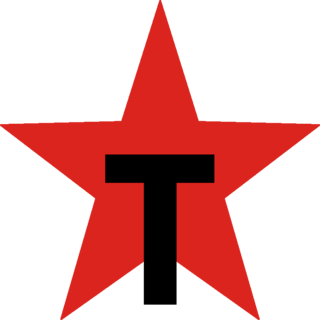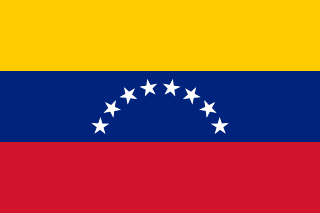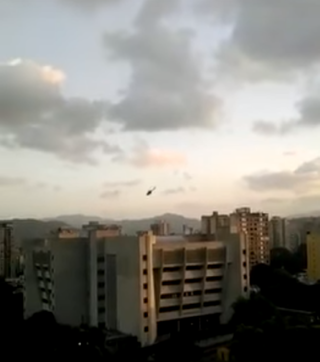Related Research Articles

The Supreme Justice Tribunal is the highest court of law in the Bolivarian Republic of Venezuela and is the head of the judicial branch. As the independence of the Venezuelan judiciary under the regime of Nicolás Maduro is questioned,there have recently been many disputes as to whether this court is legitimate.
El Nacional is a Venezuelan publishing company under the name C.A. Editorial El Nacional,most widely known for its El Nacional newspaper and website. It,along with Últimas Noticias and El Universal, are the most widely read and circulated daily national newspapers in the country. In 2010,it had an average of 83,000 papers distributed daily and 170,000 copies on weekends.
Últimas Noticias is a tabloid newspaper in Venezuela founded in 1941 after pro-freedom measures implemented by President Isaías Medina Angarita and was the largest circulated newspaper in Venezuela prior to 2014. It historically had a center-left stance and was initially friendlier to the Hugo Chávez administration. The newspaper became more critical of chavismo in the late 2000s and early 2010s. After it was bought in 2013 by British financier Robert Hanson,its editorial line became less critical of the government.

Revolutionary Movement Tupamaro,often shortened to Tupamaro,is a far-left Marxist-Leninist communist party and one of the most prominent colectivos in Venezuela. Several Tupamaros participate in peaceful movements while some believe in the "idea of armed struggle as a means to gain power." The group supports the National Liberation Army (ELN) and allegedly had ties with Revolutionary Armed Forces of Colombia (FARC).

The level of corruption in Venezuela is very high by world standards and is prevalent throughout many levels of Venezuelan society. Discovery of oil in Venezuela in the early 20th century has worsened political corruption. The large amount of corruption and mismanagement in the country has resulted in severe economic difficulties,part of the crisis in Venezuela. A 2014 Gallup poll found that 75% of Venezuelans believed that corruption was widespread throughout the Venezuelan government. Discontent with corruption was cited by demonstrators as one of the reasons for the 2014 and 2017 Venezuelan protests.

Tibisay Lucena Ramírez was a Venezuelan politician,president of the National Electoral Council (CNE) between 2006 and 2020,one of the five branches of government of Venezuela. Since 2017,Lucena was sanctioned by several countries for her role in undermining democracy and human rights in the country.
Crime in Venezuela is widespread,with violent crimes such as murder and kidnapping increasing for several years. In 2014,the United Nations attributed crime to the poor political and economic environment in the country—which,at the time,had the second highest murder rate in the world. Rates of crime rapidly began to increase during the presidency of Hugo Chávez due to the institutional instability of his Bolivarian government,underfunding of police resources,and severe inequality. Chávez's government sought a cultural hegemony by promoting class conflict and social fragmentation,which in turn encouraged "criminal gangs to kill,kidnap,rob and extort". Upon Chávez's death in 2013,Venezuela was ranked the most insecure nation in the world by Gallup.

Luisa Marvelia Ortega Díaz is a Venezuelan lawyer. Between December 2007 and August 2017,she served as the Prosecutor General of Venezuela. A proponent of the Chavismo ideology,Ortega Díaz was fired as Prosecutor General on 5 August 2017 by the Supreme Tribunal of Justice and the Constituent National Assembly (ANC) promoted by Nicolás Maduro,following a breaking with the Maduro government as a result of the 2017 Venezuelan constitutional crisis in the context of the crisis in Venezuela. This dismissal was rejected by the opposition-led National Assembly of Venezuela,arguing that only that institution had the power to carry out said removal according to the Constitution,and cataloging the Prosecutor as the only legitimate authority of the Public Ministry. As a result,she is called by the National Assembly,the Supreme Tribunal of Justice of Venezuela in exile and some media outlets as the Prosecutor General of Venezuela in exile.
Iván Antonio Simonovis Aranguren is a Venezuelan criminal science expert and security consultant,who served as security chief during the Llaguno Overpass events of April 2002 in Caracas.

On 29 March 2017,the Supreme Tribunal of Justice (TSJ) of Venezuela took over legislative powers of the National Assembly. The Tribunal,mainly supporters of President Nicolás Maduro,also restricted the immunity granted to the Assembly's members,who mostly belonged to the opposition.

On 27 June 2017,there was an incident involving a police helicopter at the Supreme Tribunal of Justice (TSJ) and Interior Ministry in Caracas,Venezuela. Claiming to be a part of an anti-government coalition of military,police and civilians,the occupants of the helicopter allegedly launched several grenades and fired at the building,although no one was injured or killed. President Nicolás Maduro called the incident a "terrorist attack". The helicopter escaped and was found the next day in a rural area. On 15 January 2018,Óscar Pérez,the pilot and instigator of the incident,was killed during a military raid by the Venezuelan army that was met with accusations of extrajudicial killing.
Susana Virginia Barreiros Rodríguez is a Venezuelan judge,most notable for leading the case and sentencing against the opposition leader Leopoldo López. She was provisionally designated as Public Defender of Venezuela in 2015,until her resignation,which saw the role being given to Carmen Marisela Castro on 8 January 2019.
Parliamentary elections were held in Venezuela on 6 December 2020. Aside from the 167 deputies of the National Assembly who are eligible to be re-elected,the new National Electoral Council president announced that the assembly would increase by 110 seats,for a total of 277 deputies to be elected.

Maikel JoséMoreno Pérez is a lawyer,doctor of Venezuelan constitutional law,and judge who currently serves as president of the Supreme Tribunal of Justice of Venezuela.
The Supreme Tribunal of Justice of Venezuela (TSJ) in exile is an institution that some,including the Organization of American States,consider to be the legitimate highest court of law in Venezuela and the head of the judicial branch,as opposed to the Supreme Tribunal of Justice. It was established on 21 July 2017 following the 2017 Venezuelan constitutional crisis. The TSJ's 33 members have been based in Chile,Colombia,Panama,and the United States due to the political crisis in Venezuela.

Chavismo:The Plague of the 21st Century is a 2018 documentary film directed by Gustavo Tovar-Arroyo. The film is an analysis of the causes,social,political and economic that caused the rise of Hugo Chávez as president of Venezuela;his abuse of power and the response of civil society,including the student movement;his political fall as well as the secrecy that surrounded his illness and the succession of Nicolás Maduro.

Presidential elections are scheduled to be held in Venezuela by 2024 to choose a president for a six-year term beginning on 10 January 2025. Leading opposition candidates have been disqualified from participating in the election during campaign or in previous elections. In June 2023,the leading candidate María Corina Machado was barred from participating by the Venezuelan government for alleged political crimes. This move has been regarded by the opposition as violation of political human rights and has been condemned by international bodies like the Organization of American States,the European Union,and Human Rights Watch,as well as countries such as Colombia,Paraguay,Uruguay,Ecuador,United States,United Kingdom,Germany,Chile,Canada,France and Mexico.

Regional and municipal elections were held in Venezuela on 21 November 2021. In the elections,all executive and legislative positions of the 23 federal entities,as well as that of the 335 municipalities of the country,were renewed.
Jhannett María Madriz Sotillo is a Venezuelan politician and judge. She currently serves as a magistrate of the Electoral Chamber of the Supreme Tribunal of Justice of Venezuela.

During Nicolás Maduro government,there have been several interventions of political parties in Venezuela. The interventions are mandated by the pro-government Venezuelan Supreme Tribunal of Justice. During these interventions,the leadership or most of the political party members end up suspended,expelled or replaced by members appointed by the TSJ.
References
- 1 2 3 "Miriam Del Valle Morandy Mijares". Supreme Tribunal of Justice of the Bolivarian Republic of Venezuela . Archived from the original on 1 October 2015. Retrieved 1 October 2015.
- 1 2 3 Gregorio Martínez, José (24 May 2015). "¿Quién es Miriam Morandy, la exmagistrada que viajaba con un narco?". Tal Cual . Retrieved 1 October 2015.
- 1 2 3 Francisco Alonso, Juan (27 May 2015). "Caso de la exmagistrada Morandy no figuró en la agenda del pleno del TSJ". El Universal . Retrieved 1 October 2015.
- ↑ "La pelea es a muerte…Chavismo Vs. Chavismo". Barómetro Político. Archived from the original on 1 October 2015. Retrieved 1 October 2015.
- ↑ "El presunto narcotraficante Richard Cammarano le escribe una carta a Maduro". Runrunes (in Spanish). Tal Cual. 2015-09-25. Retrieved 2023-11-19.
- ↑ "Dirigente justifica marcha convocada por opositor preso en Venezuela". Notimex. 26 May 2015. Archived from the original on 1 October 2015. Retrieved 1 October 2015.